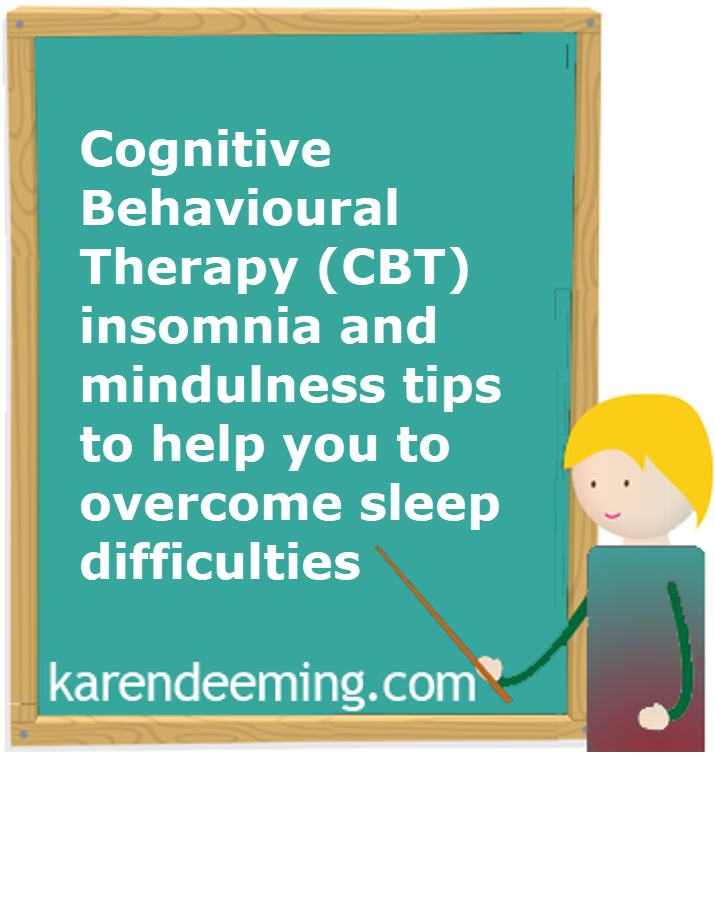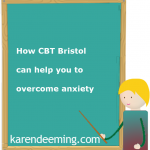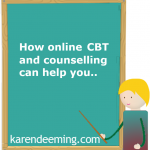

In response to Coronavirus (Covid-19), I am offering telephone, online counselling and CBT sessions via Zoom and WhatsApp.
Most of my clients over the past year have reported diffulties with sleeping, so I thought it might be helpful to share a few Cognitive Behavioural Therapy (CBT) insomnia and sleep hygiene tips:
So what is sleep hygiene?
Sleep hygiene is a variety of different practices that are necessary to have normal, quality nighttime sleep and full daytime alertness.
What does healthy sleep pattern look like?
According to the National Sleep Foundation:
“The most important sleep hygiene measure is to maintain a regular wake and sleep pattern seven days a week. It is also important to spend an appropriate amount of time in bed, not too little, or too excessive. This may vary by individual; for example, if someone has a problem with daytime sledeepiness, they should spend a minimum of eight hours in bed, if they have difficulty sleeping at night, they should limit themselves to 7 hours in bed in order to keep the sleep pattern consolidated.”
Here’s some CBT insomnia and other practical tips to help you to overcome sleep difficulties:
- Avoid stimulants such as tea, coffee or any caffeine products, nicotine or alchol close to bedtime
- Try sprinkling a small amount of lavender oil on your pillow just before bedtime
- Avoid eating anything substantial ideally at least two hours before bedtime
- Research indicates that engagement in emails and social media activities such as a facebook and twitter can overstimulate the mind resulting in difficulty sleeping, so as part of my daily bed time routine, I ensure that I cease sending emails or engaging in face book or twitter for at least two hours before going up to bed
- Adopt a healthy pre bedtime routine such as the three minute breathing space mindfulness meditation or listen to some relaxing music
- If you are struggling to fall asleep for longer than 30 minutes, instead of allowing your mind to wander in bed, get up and meditate or sit upright in a chair until you feel sleepy. Don’t watch tv or engage with the internet
- Avoid watching tv or your i player in bed
- Resist taking afternoon naps
- Regular exercise can support good sleep
- If possible, aim to go to bed most evenings before 11pm with the aim of sleeping for at least 7 hours
- If you begin to catastrophize, ruminate or over analyse pause, stop then breathe slowly through your belly and remind yourself to remain in the present moment
- Avoid using words such as what if, should and but…
If after reading these CBT insomnia tips you are still struggling to sleep and are feeling overwhelmed with distractions and negative thoughts because of this, don’t panic or give up just yet.
Instead of focusing on scarcity and deprivation and telling yourself “I’m really anxious that I won’t sleep tonight” and of allowing yourself to experience positive and pleasure thoughts such as “I’m really happy to be in bed and that I will sleep well tonight,” try this approach:
Wake up each morning by developing a positive mindset of abundance.
Here’s how to do it:
- Firstly, adopt a positive affirmation statement in the present tense such as “I’m happy and grateful that I have a pleasant, uninterrupted night’s sleep this evening and that I wake up feeling totally refreshed,” repeat this at least 40 times each evening just before going to sleep, for at least a four week period.
- Then, grab or take a photo of yourself following a good night’s sleep and look at this during each affirmation.
- Last but not least, frequently reflect on this statement: “if you never give up you never fail.”
Sounds simple and perhaps mumbo jumbo doesn’t it? However, I have also used this technique with several clients and friends to help them tackle issues such as:
- overcoming procrastination
- overcoming addictions
- overcoming shyness, low self esteem and social phobia
- overcoming anxiety and exhaustion
- overcoming loneliness
The results have often been astounding. Having said that though, most of these clients have undertaken a few CBT insomnia or mindfulness sessions with me, before adopting the above exercise in order to achieve their goals.
Counselling, CBT, psychotherapy sessions or a personal development or mindfulness course can also help you to overcome sleep issues or insomnia.
According to Oxford University Mindfulness Professors, thousands of peer-reviewed scientific papers prove that mindfulness and CBT techniques enhances mental and physical wellbeing, and that it helps us to overcome sleepless nights and insomnia.
So if you want to reduce anxiety, stress, depression, exhaustion, sleepiness and insomnia they all decrease with regular sessions of mindfulness and CBT exercises and meditations.
Mindfulness can also help you to improve your reaction times at home and at work.
Another benefit of CBT insomnia and mindfulness tools are that they can enhance memory retention and an increase in mental and physical stamina.
Research also indicates that those of us who practice mindfulness regularly are calmer, happier, more contented and less prone to psychological distress.
NIGHT NIGHT AND SWEET DREAMS EVERYONE !!!!
If you have decided to consider Cognitive Behavioural Therapy (CBT), and are not quite ready yet to make contact or to arrange your first session:
By clicking on the links below you can find out more about:
My Cognitive Behavioural Therapy (CBT) specialisms include though are not limited to:
- obsessive compulsive disorder
- low self esteem and shyness
- anger, anxiety, pain and stress management
- sleep difficulties and insomnia
Click here for details about my CBT qualifications, experience and accreditations.
See my Client Testimonials here.


![Karen_Deeminga[1]](http://www.karendeeming.com/wp-content/uploads/2015/09/being-practice-self-portrait-e1541437891746.jpg) Welcome to my site. if you have any queries then please
Welcome to my site. if you have any queries then please

